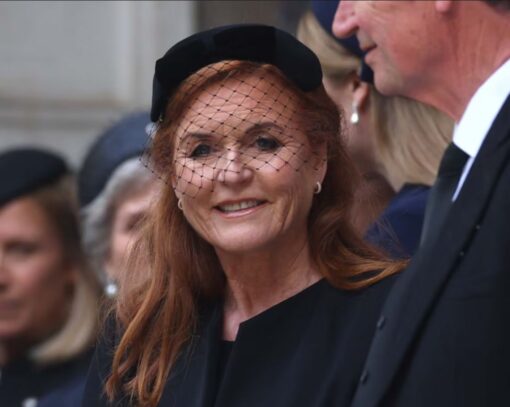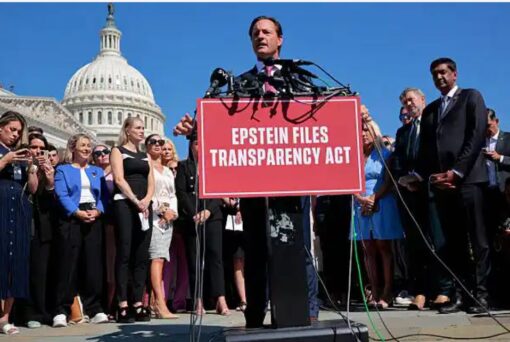The Duchess of York, Sarah Ferguson, is once again at the center of a royal storm after explosive claims surfaced that Jeffrey Epstein threatened to “destroy her” in a chilling phone call more than a decade ago, prompting an extraordinary apology email that has now re-emerged.
The disclosure has revived questions about her past dealings with the disgraced financier and triggered a fresh wave of criticism, leading several charities to sever ties with her.
The controversy dates back to 2011, when Ferguson publicly distanced herself from Epstein after admitting she had accepted money from him to help settle personal debts.
At the time, she told a London newspaper that she had made a “terrible, terrible error of judgment” and insisted she would repay every penny. But what was not known then was that, in the aftermath of those remarks, Epstein allegedly called her directly, delivering what has been described as a menacing and calculated threat.

According to her former spokesperson, the late financier’s voice was “cold, calm and really menacing” and carried the tone of “a Hannibal Lecter-type character.”
“He said he would destroy the York family and he was quite clear on that. He said he would destroy me too,” Ferguson’s ex-spokesperson recalled. “It wasn’t shouting, it wasn’t bluster. It was icy and deeply unnerving.” Those words, he added, were seared into his memory, highlighting the immense pressure Ferguson faced at the time.
Faced with that intimidation, Ferguson allegedly drafted an apology email to Epstein in which she called him a “supreme friend” and expressed regret for criticizing him publicly.
In the note, she reportedly acknowledged that he felt “hellaciously let down” and sought to mend fences, at least in writing, with a man who was already a convicted sex offender. The tone of the letter was strikingly deferential, contrasting sharply with her earlier statement that she abhorred pedophilia and sexual exploitation of children.
The resurfacing of that email this week has reignited scrutiny of Ferguson’s judgment, her ties to Epstein, and her role within Britain’s charitable and royal circles.
Several long-standing charities announced they were cutting ties with the Duchess after the revelations became public. The Teenage Cancer Trust, which had counted her as a patron for 35 years, confirmed it could no longer maintain its association.
Other organizations, including Julia’s House children’s hospice, Prevent Breast Cancer, the Natasha Allergy Research Foundation, and the National Foundation for Retired Service Animals, issued similar statements. The British Heart Foundation also confirmed Ferguson was no longer serving as an ambassador.
For Ferguson, who has faced decades of tabloid attention over her private life, financial troubles, and strained royal relations, the timing could not be worse.
“Her family and children will always come first for her, but the pressure she was put under back then was immense,” her former aide explained. “This was long before Prince Andrew’s own life was overshadowed by Epstein, and she was doing what she thought necessary to shield those closest to her.”
Epstein’s death in a Manhattan jail in 2019, officially ruled a suicide while awaiting trial on sex-trafficking charges, did not put an end to the scrutiny of his network of contacts.
Instead, it ignited years of speculation, legal battles, and renewed public anger over how he managed to cultivate ties with powerful figures across politics, finance, and royalty. Ferguson’s association with him, however brief, has repeatedly resurfaced as part of that broader narrative.
Observers note that the Duchess’s actions in 2011 were consistent with a long-standing pattern of financial vulnerability. Ferguson has often spoken candidly about her money woes, admitting in past interviews that she had made “mistakes” out of desperation.
In the Epstein case, she had accepted £15,000 to reduce her debts, only to later describe the decision as catastrophic. But the revelation that she privately sought forgiveness from Epstein after condemning him publicly has stunned many supporters who believed she had drawn a clear line years ago.
“This revelation is deeply damaging,” said one royal historian. “It reinforces the perception that Epstein wielded influence not just through money but through fear, intimidation, and the promise of reputational ruin. That a member of the royal family felt compelled to apologize to him shows how far-reaching his manipulations were.”
For critics, the affair is also another reminder of how Epstein operated. Known for cultivating elite social connections, he frequently leveraged those ties to protect himself from accountability. That a duchess, even one estranged from the core royal household, would write to him with such deference reflects the extent of his power at the time.
The fallout for Ferguson has been swift. Charities that cut ties cited reputational risk, with one organization saying privately it could not be associated with “anyone linked to Epstein in any capacity.”
Social media reaction has been equally fierce, with users questioning how someone once considered a light-hearted, approachable royal figure could have maintained any communication with a man whose crimes were already publicly known.
Yet defenders argue that the Duchess was operating under duress. “The pressure on her was immense,” one acquaintance insisted. “She was terrified for her family. Epstein was threatening legal action and reputational destruction. It is not difficult to see why she felt she had no choice but to write what she did.”
The scandal also raises broader questions about the monarchy’s struggle to navigate scandals tied to Epstein. Prince Andrew’s catastrophic 2019 television interview about his own friendship with Epstein forced him to step back from public duties indefinitely, a move that has cast a long shadow over the institution. Ferguson’s renewed controversy only deepens that wound, reminding the public that the Epstein connection stretches beyond one royal.
As the controversy unfolds, some suggest Ferguson may need to issue a fresh public statement addressing the revelations. Thus far, she has remained silent, allowing past quotes to speak for her.
In her 2011 comments, she vowed never to have anything to do with Epstein again and promised to repay the money she accepted. Whether that pledge was fulfilled remains unclear.

The latest developments also underscore how Epstein’s legacy continues to destabilize reputations years after his death. From politicians facing scrutiny over photographs to business leaders investigated for past dealings, the ripple effects show no sign of abating.
For Ferguson, whose image has oscillated between scandal and redemption for decades, the reappearance of an old email may prove one of the most damaging episodes yet.
“He was one of the most manipulative men I ever encountered,” her former spokesperson said. “People don’t understand how terrible Epstein was. That phone call was chilling. I am surprised anybody was ever friends with him given the way he spoke.”
With the charities walking away and renewed media focus on her judgment, Ferguson faces an uphill battle to salvage her public image. While she remains a devoted mother and grandmother, her role as a royal representative and philanthropist has been severely undermined.
For many Britons, the lingering question is whether she can ever fully separate herself from the shadow Epstein cast over her life and the wider royal family.


